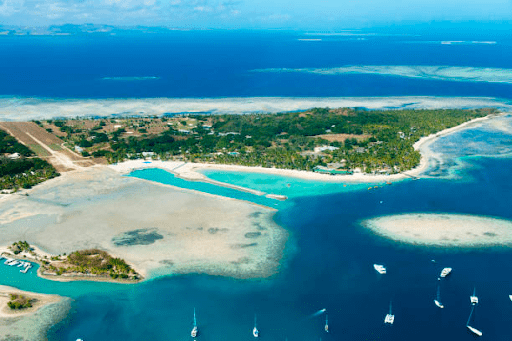What are the religions of Fiji?
Fiji has quite a large religious following, and Christian is deemed the state religion due to the numerous involvement of the (Methodist) church in national politics. Yet, that hasn’t overshadowed the existence of other various religious groups living alongside Christians in the country, such as those of the Islam, Hindu and Sikh faith. Fiji, in this age, has evolved into a very religiously diverse nation, moving away from the ethnic lines that it has been previously bonded to.

Sacred Heart Catholic Church, Suva
Salvation to the Cannibal Islands
Prior to the arrival of Christianity, the islands of Fiji consisted of several hostile and violent chiefdoms, often engaging in trade, and alliances but in most times conflict.
As stated by Lange in his book, ‘Island Ministers’, Christianity began in Fiji in 1830 with the coming of three Tahitian missionaries from the Ma’ohi London Missionary Society (LMS). They first arrived in the eastern part of Fiji, in the islands of Lakeba and Oneata. Their progress was sure but slow, and with the arrival of Wesleyan missionaries, Rev. William Cargill and David Cross in 1835, these Tahitian missionaries quickly nestled under their wing. Indigenous reception to Christianity was quite hostile, and in most situations, missionaries were met with great opposition, but progress was firm even in war-torn provinces like Rewa. But perhaps the real progress in indigenous conversions was the conversion of ‘King of Fiji’ claimant, Ratu Cakobau in 1854.
Fiji being in a socially hierarchical order meant a guaranteed easy conversion of the masses when the head of the hierarchy, their chief converted. The conversion of Cakobau’s allied chiefs soon followed after, along with their vanua (people/land). By the 1900’s a great number of indigenous natives were Christians, and missionaries had now become a familiarity in Fijian communities. The term, ‘talatala’ which translates to ‘send or inform’ was now coined for missionaries.
However, not all natives became Wesleyan Methodists after Cakobau, but about 10 percent of the population became Catholic converts instead, since a Roman Catholic mission was also set up in Lau in 1844. Apart from Cakobau’s conversion minimizing cannibalism; the use of natives as agents of Christianity ministry was another way of spreading Christianity across the islands. Supposedly, conversions to Christianity were not because some natives found actual salvation, but rather some turned to Christianity as a result of direct defiance to traditional authority, therefore conversion was a power play.
The incorporation of certain indigenous customs to remain in Fiji Christian culture has allowed for Kava to be a vital part of church life (Methodism/Catholicism). Luva-ni-tai, which translates to ‘taking the necktie off’, is done after church when Kava is mixed and drunk to thank the reverend or whoever gave the sermon, for his time. Christians today account for about 57 percent of Fiji’s population and remain Fiji’s largest religion.
Foreign Religions in the Pacific
Hinduism and Islam, another of Fiji’s religions, are practiced by the majority of Fiji’s Indian population. It was brought to the pacific with the arrival of Indians under the indentured system in the late 1800’s.
Hinduism, originating in South Asia, is considered to be one of the oldest religions in the world. It practices a diverse range of philosophies, ancient texts, mythology, metaphysics and cosmology. About a hefty number of India’s population are of the Hindu faith, and likewise, a large number of Fiji’s Indian population are as well. According to Fiji’s 2007 census, this accounts for about 37 percent of the nation’s Indian population.

Islam, the indentured labourer’s second religion, varies greatly from its other religious counterpart, Hinduism. Historically, India, which had been predominantly Hindu, was invaded by Muslim Arabs from the north-west around the 7th century in the province of Sindh of present-day Pakistan. From what can be gathered Pakistan, which gained independence from India in 1947, has always had a very sensitive diplomatic relation with its neighbour. Islam accounts for about 20 percentage of the Fiji’s Indian population and has remained a significant part of Fiji’s religious diversity, even allowing for a small number of indigenous converters.
Fiji’s other minor religions
Another South Asia’s religion that relatively has a small portion of Indians practicing its faith is Sikhism. The origins of Sikhism in Fiji are different from other South Asian religions, nor was it British influenced or indigenous. Founded by Guru Nanak, the religion attains that there is only one God and that the human form is genderless and all beings equal. The religion contains three basic principles of meditation/devotion to the creator, truthfulness and selfness toward others.
Unlike Hindus of the indentured system, practitioners of Sikhism arrived in Fiji as free immigrants. A great number of them came for better opportunities in the pacific. Some settled in Fiji and took up Hindu wives, while the rest returned to India. Additionally, a significant number of policemen that were of Sikh faith were brought via Hong Kong and Shanghai. Practitioners of Sikhism, most of whom are Indians, make up less than a percent of Fiji’s primary religions.

There is also a small group Ba’hai and Jewish groups present in the country, the latter an outcome of early settlers, some of whom were of Jewish ethnicity. The Ba’hai originated in Fiji in the 1950’s. A religion of middle eastern origin, it incorporates the teachings of most religions and the unity and equality of all people. Judaism which is the religion of Jewish people, predates and is the genesis of Christianity. Although, Judaism beliefs do not acknowledge the existence of Jesus, unlike Christianity
The endorsement of Fiji’s shift to secularism, under the 2014 Fiji constitution has allowed for more religious freedom in the country. There has been a revert to pre-Christian religions of indigenous ancestral worship or religions incorporating both ancestral and Christian beliefs. A known instance is the Lotu vanua, who incorporate a mixture of Christian and ancestral religion. There are also numerous other religious cults in our rural communities and villages that are lesser known and overlooked.
Fiji, in 2022, has become a very religiously diverse and tolerant country, acknowledging at least one religious public holiday for each religion. These public holidays are Diwali for Hindus, Prophet Mohammed’s birthday for Muslims and Easter for Christians.
